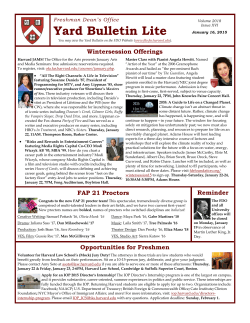
Harvard-China Forum on Islamic and Arabic Studies The Harvard
Harvard-China Forum on Islamic and Arabic Studies The Harvard-China Forum is a unique gathering of distinguished scholars of Islamic and Arabic studies from Harvard and universities across China to examine the state of the field at Harvard and in Chinese universities. Western and Chinese scholars of Islamic and Arabic Studies receive training in diverse pedagogical methods and teach in distinct social, cultural, and educational settings. These contexts, together with the history and evolution of religious studies in China and the West, have greatly influenced the teaching of Islam in a post-secondary environment. In four sessions over two days, preeminent scholars will not only discuss how such contexts inform teaching and learning in their respective countries, but will also consider contemporary approaches to Islamic studies in light of such phenomena as globalization and the digitalization of education. The forum is organized by the Alwaleed Islamic Studies Program at Harvard University. The Program is dedicated to furthering the scholarly study of Islam and the Muslim world in a global and transnational context by advancing interdisciplinary studies that are cross-national and comparative. The Program seeks to promote the diffusion, exchange and discussion of a wide body of research, and to encourage interaction among academics—at Harvard and beyond— from various traditions of learning. Central to its academic and scholarly objectives, the Alwaleed Program seeks to bridge gaps in understanding between the Muslim and non-Muslim worlds through public lectures, arts and cultural performances and conferences. The goals of this forum are consistent with the mission of Harvard’s Prince Alwaleed bin Talal Islamic Studies Program to expand the study of Islam and Muslim communities at Harvard University to regions beyond the Middle East, including China. Mission Statement: I. To provide an environment conducive to fostering the sharing of knowledge and community-building between leading Islamic and Arabic studies scholars at Harvard and China II. To present a nuanced and holistic understanding of teaching and learning about Islam and Muslim societies in the contexts of Chinese and American universities III. To foster sustained dialogue between scholars of Islamic Studies engaged in research about geographically and culturally diverse Muslim communities IV. To explore new pedagogies in Islamic and Arabic studies, particularly the incorporation of new technologies and frameworks and learner-centered approaches. Host: Harvard Shanghai Center- http://shanghaicenter.harvard.edu/ 5/F, Shanghai IFC-HSBC Building, 8 Century Avenue, Pudong, Shanghai 200120, China Date: May 25-26, 2015 Supporting Organizations: 1. Harvard China Fund – The Harvard China Fund seeks to advance the University's engagement with China. Established in late 2006, the Harvard China Fund is Harvard University’s “academic venture fund” for China. In service of the entire University, it supports teaching and research on China and promotes Harvard’s presence in China. http://hcf.fas.harvard.edu/ 2. Battuta Knowledge, Limited- Promoting knowledge-centric communities through cross-cultural, multi-disciplinary and digital collaborations in teaching and learning of critical global themes, founded by Tariq Jawad in 2010 http://www.battutaknow.com/index.html Draft Agenda Monday, May 25th *7:45 – Panelists picked up from the hotel and delivered to Harvard Shanghai Center 8:00 9:00 9:15 9:20 9:30 Registration, Tea & Coffee Introduction: Yi Wang, Executive Director of University Programs from Harvard Shanghai Center Tariq Jawad, Founder of Battuta Knowledge Limited, introduces Professor Ali Asani Ali Asani, Professor of Indo-Muslim and Islamic Religion and Cultures; Director, Alwaleed Islamic Studies Program Panel #1: Contexts: How contexts affect teaching and learning about Islam & the Arab World a. Socio-political and religious-cultural contexts: The U.S/West and China/Far East b. Educational contexts: Liberal arts university and Chinese educational system c. History and evolution of religions studies in the U.S and China Panelists: - Professor Zhu Weilie, Professor and Honorary Director of Institute of Middle East Studies, Shanghai International Studies University - Professor Wang Jianping, Professor of Shanghai Normal University - Harvard: William Granara, Professor of the Practice of Arabic; Director of Modern Language Programs and Director of the Center for Middle Eastern Studies 11:00 Break-‐out Session 12:30 Lunch at Harvard Shanghai Center Panel #2 Methodologies: Contemporary and emerging approaches to Islamic 14:00 studies a. What is Islam? Diverse discourses, histories, cultures, and experiences b. Promoting religious literacy – the cultural studies approach c. Multi-disciplinary approaches d. Fostering learner engagement Panelists: - Professor Yang Shengmin, Professor of the School of Ethnology and Sociology, Minzu University - Professor Shui Jingjun, Professor of Chinese Muslim women, Henan Academy of Social Science - Harvard: Ali Asani, Professor of Indo-Muslim and Islamic Religion and Cultures; Director, Alwaleed Islamic Studies Program Break-out Session Dinner for Panelists hosted by Tariq Jawad 15:30 18:30 Notes: 1. Tariq Jawad can make the introductions to each Panel and also give brief bios of each Panelist? 2. There will be 3 break-‐out rooms each chaired by a Panelist. Participants will be given a number upon registration directing them to one of the break-‐out rooms Tuesday, May 26th *7:45 – Panelists picked up from the hotel and delivered to Harvard Shanghai Center 8:00 9:00 9:15 Registration, Tea & Coffee Introduction: Yi Wang, Executive Director of University Programs from Harvard Shanghai Center Panel #3: The 21st century global classroom on Islamic and Arabic Studies a. Student diversity and community involvement: Religious studies as dialogue b. International scope of teaching and learning c. Communications and media technologies Panelists: - Professor Zhang Hong, Professor of Department of Arabic Language, Beijing Foreign Studies University, Formal President of China Arabic Education Association - Chinese Professor? - Harvard: Ahmed Ragab, Richard T. Watson Assistant Professor of Science and Religion 11:00 Break-‐out Session 12:30 Lunch at Harvard Shanghai Center Panel # 4: Envisioning together the future of Islamic and Arabic studies 14:00 a. Current needs b. Emerging trends -- studying Islam as a global tradition c. Planning cross-border collaborations 15:30 18:30 Notes: Panelists: - Professor Yang Guang, Director of the Institute of Western Asian and African Studies, Chinese Academy of Social Sciences, President of Chinese Association of Middle Eastern Studies - Professor Li Shaoxian, President of Chinese Academy of Arab Studies, NingxiaUniversity. VP of Chinese Association of Middle Eastern Studies - Harvard: Ousmane Kane, Prince Alwaleed Bin Talal Professor in Contemporary Islamic Religion and Society Break-out Session Dinner? 1. Tariq Jawad can make the introductions to each Panel and also give brief bios of each Panelist? 2. There will be 3 break-‐out rooms each chaired by a Panelist. Participants will be given a number upon registration directing them to one of the break-‐out rooms
© Copyright 2025









